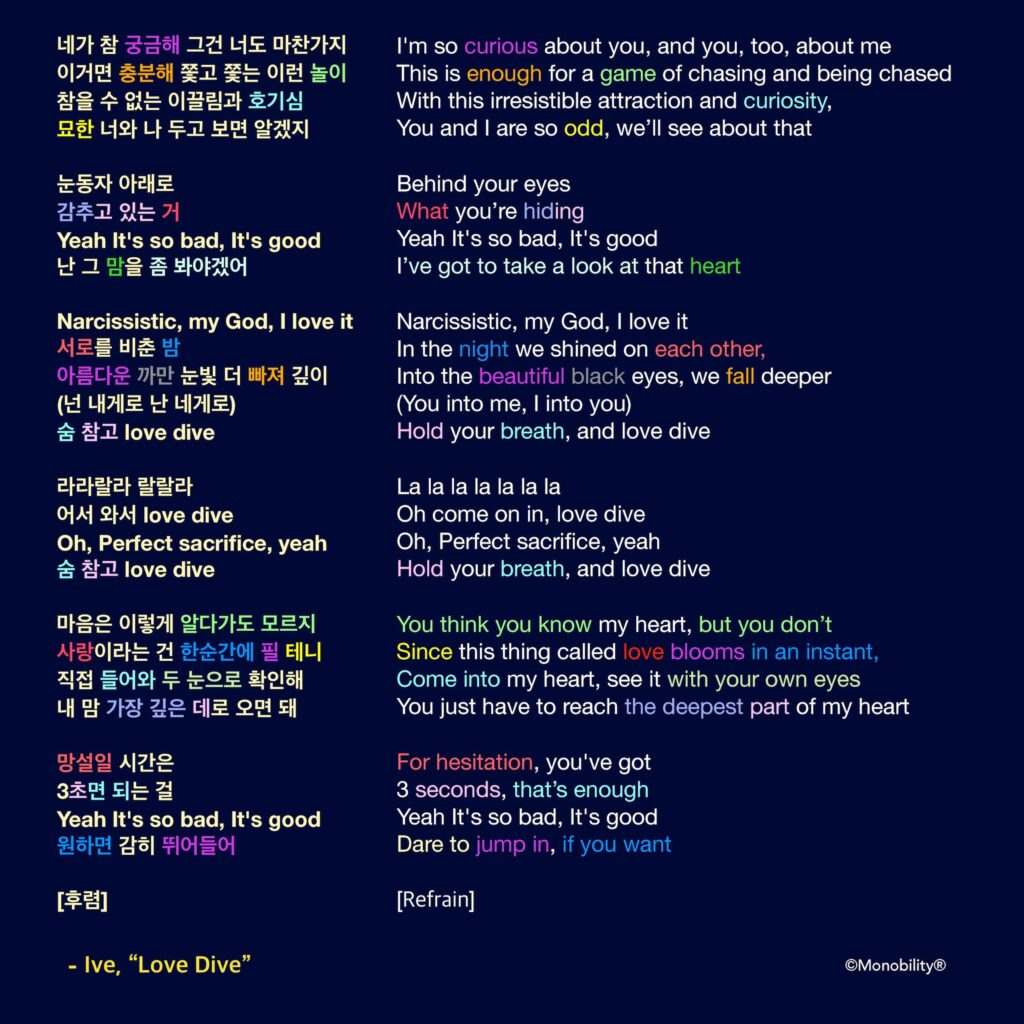
궁금하다 to be curious / to wonder about [ The subject with the subject marker (-이/가) of this Korean adjective corresponds to the object of the English verb ]:
- 나는 네가 궁금해 I am curious about you [ 네-가 ]
- 우리는 그것이 궁금해요 We wonder what it is [ 그것-이 ]
마찬가지 it is the same [ this phrase often takes the subject + 도, meaning “also”]
- 그건 너도 마찬가지야 It is the same for you, too. The situation is the same for you as well.
이거면 = 이것이면 if this is it
충분해 is enough
쫒다 to chase; 쫒기다 to be chased [ Although the lyrics go “쫒고 쫒는” which would mean “to chase and chase”, the usual Korean idiomatic phrase is always “쫒고 쫒기는” (to chase and to be chased) ]
놀이 game, play
참다 to bear, to resist; 참을 수 없다 can’t resist => 참을 수 없는 irresistible, unbearable
이끌림 being attracted
호기심 curiosity
묘하다 odd, uncanny
두고 보다 to wait and see; “두고 보자…” We shall see [ idiomatic expression ]
눈동자 pupil (of an eye)
아래 under, beneath
감추다 to hide; 감추고 있다 to be hiding [ verb + 고 있다 present progressive tense ]
거 = 것 thing [ often used as the relative pronoun “what” when it is preceded by the relative clause ending “-ㄴ/은/는”; 감추고 있는 거 the thing that you’re hiding = what you’re hiding ]
맘 = 마음 heart, mind, spirit, soul
봐야겠어 I’ve got to look/see; 보다 to see/look; [(verb)-아야/어야겠어 I’ve got to … ]
눈빛 gaze, look in the eye, the way someone looks at you [ 눈 eye + 빛 light or color ]
빠지다 to fall
깊이 deeply
숨 breath
참다 to bear, to hold; 참고 hold and [ verb stem +고 …, and ]
알다가도 모르지 You think you know … , but you don’t. [ idiomatic expression to describe something unpredictable, changeable, or mysterious ]
- 여자 마음은 참 알다가도 모르는 거야 You think you know a woman’s heart, but you don’t. What a woman thinks is unpredictable. [ i.e., “La donna è mobile qual piuma al vento”, Giuseppe Verdi, Rigoletto ]
- 알다가도 모르는 게 사랑이란 거야 You think you know what love is, but you don’t. [ i.e., “L’amour est enfant de bohème; Il n’a jamais jamais connu de lois”, Georges Bizet, Carmen ]
사랑이라는 거 This thing called love [ (noun)-이라는 것 the thing called … / what they call … ]
사랑이란 게 지겨울 때가 있지 Sometimes, this thing called Love can be so exhausting 내 맘에 고독이 너무 흘러 넘쳐 When loneliness spills out from my heart; 눈 녹은 봄날 푸르른 잎새 위에 On a warm Spring day melting the snow on a green, green leaf, 옛사랑 그대 모습 영원 속에 있네 The image of you, my old Love, is in eternity [ from “옛사랑 Old Love” by 이영훈 ]
32-contraction-흰-하얀-맘-마음-korean-lyricism-옛사랑-old-love-by-이영훈-갯마을
한순간에 instantly
피다 to bloom (flower); 필 테니 = 필 테니까 [ (verb)-ㄹ/을 테니까 because … will … (causation clause ending in future tense) ]
직접 directly, for oneself, on one’s own
들어오다 to come inside, to enter
두 눈으로 with your (two) own eyes [ Koreans tend to add an unnecessarily obvious adjective “두 (two)” to modify some nouns describing body parts:
- 내 두 눈으로 똑똑히 봤어요 I saw it clearly with my own eyes
- 내가 한 입으로 두 말 하겠어요? Why would I tell a lie? [Literally, “Would I tell two different stories with my one mouth?”; idiomatic ]
확인해 Check it! [ 확인하다 to check, to see (for oneself) ]
깊은 deep [attributive]; 깊은 데 the place that is deep [ 데 = 곳 place, location, part]
오면 돼 you only have to … [ literally, if you come, it will be all right; 오다 to come; 오면 if … come; 돼 everything will be done, okay, resolved, completed ==> (verb)+면 돼 you just have to … ]
망설이다 to hesitate; 망설일 시간 time for hesitation [ (verb)-ㄹ/을 future tense relative clause ending ]
3초 three seconds [ 초 second (unit); 3 = 삼 (use sino-Korean numerals for minutes and seconds) ]
3초면 되는 걸 3 seconds will be enough; it only takes 3 seconds (to get things done, to be resolved; See above) ]
원하면 if you want (to)
감히 dare to [ In polite and educated conversations, this adverb should be avoided, or used with utmost care, at the very best. Unlike English, this Korean word sounds either too archaic or too offensive to be used in a diplomatic normal conversation. In Korean, 감히 doesn’t have the casual meaning of the English word “dare” such as “I dare you” or “truth or dare.” Therefore, if you choose to use this word in a daily one-on-one conversation in Korea today, you should be ready to risk breaking the relationship or friendship indefinitely. In this song, the last sentence sounds more like a word-for-word translation of the English usage of “dare” as a modal verb, or “I dare you to (jump in)”. Nonetheless, the Korean original sentence “감히 뛰어들어” doesn’t sound natural at all, since Koreans don’t say 감히 in a command sentence. It is another common flaw of K-Pop over-globalization. ]
- 네 여기가 감히 어느 안전이라고 입을 함부로 놀리느냐? 무엄하다! How dare you speak so carelessly in front of His Majesty? How impertinent! [ Royal courtiers warning to commoners in the court; archaic ]
- 감히 지가 뭐라고 날 차? How dare he dump me? Who does he think he is? [ Speaking to oneself or to a 3rd party after being ditched by a lover, etc. ]
뛰어들다 to jump in; 뛰어들어! [command form of 뛰어들다; informal, casual register]
Join Monobility® Group for much more:



